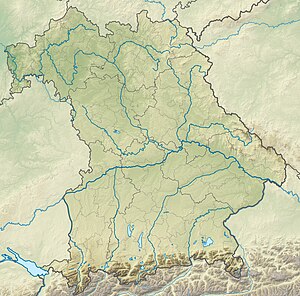Vineyard (Mainaschaff)
| Vineyard | ||
|---|---|---|
| height | 144 m above sea level NHN | |
| location | District of Aschaffenburg , Bavaria (Germany) | |
| Mountains | Spessart | |
| Dominance | 0.39 km → Scheuerberg | |
| Notch height | 17 m | |
| Coordinates | 49 ° 59 '22 " N , 9 ° 5' 23" E | |
|
|
||
The vineyard , also called Kapellenberg , is 144 m above sea level. NHN high mountain in the district of Aschaffenburg near Mainaschaff in Bavaria .
geography
The vineyard is located on the foothills of the Spessart, west of Aschaffenburg , on the northeastern outskirts of Mainaschaff, between the federal highway 3 and the federal highway 8 . The route of the Main-Spessart-Bahn , the Hennertsgraben and a small connecting road between Strietwald and Kleinostheim run below . The Marienkapelle stands on the summit and a little below a cell phone mast. From the west a way of the cross leads up the mountain.
The vineyard rises from its surroundings by around 28 m. In the northeast, the terrain rises slightly to the foothills of the Scheuerberg (230 m) on the edge of the Steinbach Gorge .
history
On the oldest map of the region, the Spessart map by Paul Pfinzing from 1594, vineyards of around 5 hectares are already recorded on this mountain . Besides the vineyards near Klingenberg , the Mainaschaffer Weinberg was the only place in Spessart where wine was grown. The Mainaschaffer viticulture has been handed down since 1259, when 1000 liters of wine had to be given to the St. Peter and Alexander monastery . Between 1836 and 1807 the area under cultivation shrank to one hectare. With the appearance of phylloxera , viticulture on the Mainaschaffer vineyard was given up. In 2005 the recultivation of the vineyards began. In 2008, Mainaschaffer wine was served for the first time in 100 years.
In 1867 a chapel was built on the vineyard. It was visible from afar through the barren vegetation on the summit and was replaced by a new church in 1954. The foundation stone of the previous building is now embedded in the wall of the new chapel. The Lady Chapel (Lourdes Chapel), which consists of an eight-meter high tower made of shell limestone , is a place of pilgrimage and often the destination of numerous large processions . At the top of the tower is a six foot high cross. Inside the church there is a statue of Our Lady donated by local residents . A way of the cross, inaugurated in 1890, leads to the top of the chapel. The stations are made of red sandstone . They were restored in 1954 and 1996.
In 1981, during excavation work, underground masonry and finally a rock cellar in the gneiss rock were found . In 1995 it was redesigned as a Marian grotto (Mary, Queen of Peace).
Shortly before the Second World War , bunkers for the Wetterau-Main-Tauber position were built on the vineyard and on the nearby Bischberg . Five reinforced concrete bunkers were built. Later they built still fighting positions , running and trenches . The bunkers were blown up after the war.





